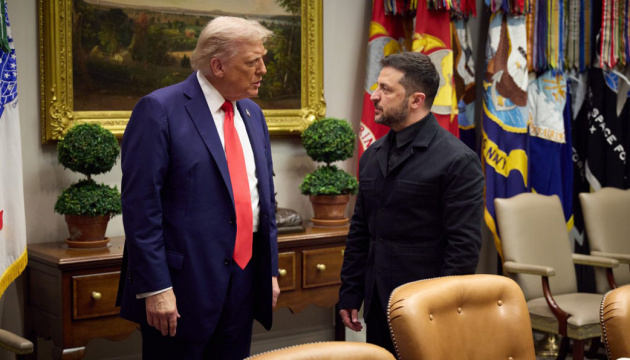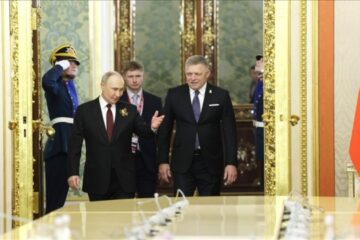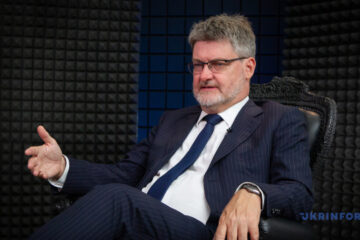
Behind the scenes of the diplomatic process, a tense struggle for the initiative continues. Everyone is now awaiting the Shanghai Cooperation Organization (SCO) summit due on August 31
On August 18, the Washington Summit was held at the White House, attended by presidents Donald Trump of the USA and Volodymyr Zelensky of Ukraine, alongside a team of top European and NATO leaders. Among the key items on the agenda were a strategy for achieving peace, in particular, a potential bilateral meeting between Volodymyr Zelensky and Putin, as well as security guarantees for Ukraine (for more details read our previous coverage).
A week has passed, which, at first glance, brought no loud statements nor breakthrough decisions. However, this silence is deceptive. In actual fact, as experts note, a sophisticated, invisible tactical struggle has got underway. So where do we stand now, what further prospects are visible here, and what should we expect in the near future?
COVERT DIPLOMACY AND A GAME OF TIME
The first thing that catches the eye after the summit is the lull in the public debate. As political scientist Ihor Reiterovych notes, “the week after the summit in Washington passed less actively than one might have expected. On the one hand, it really looked like a pause.” However, according to him, this pause does not mean inaction. On the contrary, intensive non-public work continues. “President Zelensky emphasized that a document on security guarantees would be drawn up within 7–10 days. There is still time, and as far as can be understood, the document will be unveiled later this week. Work on it is ongoing,” the expert explains.
A vivid example of this covert diplomacy was the visit to Kyiv by the U.S. special envoy, Keith Kellogg. “It is obvious that he did not come to attend the Independence Day celebrations or to receive an honorary award (Zelensky awarded Kellogg the Order of Merit, 1st class, – ed.) – meaningful negotiations are underway. And this can be considered a direct follow-up to the decisions and signals from the Washington meeting,” Ihor Reiterovych emphasizes.
Political analyst Volodymyr Fesenko agrees, noting that “in the near future, the US and Ukraine will outline the further algorithm for the negotiation process, considering the destructive position of the Russians. Actually, this is already being discussed during Keith Kellogg’s visit to Ukraine.” “President Zelensky also announced that a meeting between Ukrainian and American teams will take place at the end of the week,” the political scientist added.
And while Kyiv and Washington are coordinating their positions, Moscow is acting in its usual manner – playing for time. As Ihor Reiterovych notes, Russia “is acting in an absolutely predictable manner – manipulating, trying to sidestep the topic of a personal meeting of the leaders, constantly throwing in theses about “illegitimacy,” and inventing various formal and legal snags.” The Kremlin’s objective here is obvious – “to drag out till August 31 – the day when the Shanghai Cooperation Organization summit, which Putin intends to attend, is to open. Moscow’s further position on the negotiations with Ukraine will largely depend on the results of his talks with Xi Jinping.” Volodymyr Fesenko agrees that Putin “will go to China, where he will coordinate his further negotiating actions with the leader of the People’s Republic of China.”
Thus, on the issue of a bilateral meeting between Zelensky and Putin, the ball is clearly in the court of the Kremlin, who is obviously in no hurry to pass it back. Mr. Reiterovych is of the opinion that, for Putin, such a meeting “is extremely harmful, he is afraid of it and is actually looking for ways to avoid a direct dialogue.” Volodymyr Fesenko is even more categorical, “At the moment, a meeting between Zelensky and Putin in the coming weeks seems extremely unlikely, given the lack of willingness for such a meeting on the part of the Kremlin dictator. In addition, the preparation for this meeting requires effective mediation by a third party, preferably from the United States, which is currently not happening.”
THE TRUMP FACTOR AND THE RISKS OF AMERICAN MEDIATION
Trump remains the key figure in this process. So far, his behavior seems consistent. “It was clear that after the meeting in Washington, Donald Trump would make public statements one way or another. For the time being, he has been speaking in a fairly restrained, acceptable rhetoric… we have not heard any sharp or extraordinary statements that would indicate a change in his position after the Washington summit,” Ihor Reiterovych analyzes the rhetoric of the American president. He adds that an important signal came from a recent interview at NBS News with Vice President J.D. Vance, who “does not act as an independent politician, but rather as a repeater of Trump’s opinions.”
For short, Dee Vance stated in the aforementioned interview that Russia had made “significant concessions” in talks to end its war with Ukraine, noting that for the first time in three and a half years the Kremlin was willing to show flexibility on some of its key demands. “I think the Russians have made significant concessions to President Trump for the first time in 3 1/2 years of this conflict. They’ve actually been willing to be flexible on some of their core demands. They’ve talked about what would be necessary to end the war,” he said. “Of course, they haven’t been completely there yet, or the war would be over. But we’re engaging in this diplomatic process in good faith.”
Vance furthermore noted that more sanctions to pressure the Kremlin toward peace are possible, but those decisions would be made on a case-by-case basis (depending on the circumstances) in order to effectively change the Kremlin’s behavior. “No, sanctions aren’t off the table. But we’re going to make these determinations on a case-by-case basis. What do we think is actually going to exert the right kind of leverage to bring the Russians to the table,” Vance said.
Vice President JD Vance said he still believes the administration can broker peace between Ukraine and Russia, despite the seeming lack of progress since President Donald Trump met with Russian President Vladimir Putin this month in Alaska in an effort to push for an end to the war. He also emphasized that Ukraine has the right to “ultimately make the determination” over where to draw territorial lines in the country, and ruled out forcing turnkey decisions from the outside. So, the US vice president reiterated his position: decisions should be made by Ukrainians themselves, and the United States will not impose its decisions.
Nevertheless, Volodymyr Fesenko warns: it is American mediation that carries certain risks for Ukraine. The possibility of a trilateral summit between Trump, Zelensky and Putin, he said, “decisively depends on how persistent the Americans will be promoting in this idea.” However, such a meeting will make sense for the White House in one case only, “if a kind of compromise option for a peaceful settlement is discussed, an option that can will be acceptable for both warring parties. And it is only the Americans who can offer this compromise.”
And this, according to the expert, is where potential threats lie. “A relatively acceptable option for us is if, for example, a framework agreement on a phased ceasefire is considered. But if the Americans again offer a “territory swap” or a framework peace agreement, where most of the concessions are to be made by Ukraine, then this option is unlikely to suit us,” Fesenko emphasizes. In addition, there is a risk “that at the three-way summit, Putin may push Trump to put joint pressure on Zelensky.”
The US needs a quick and readily visible result – “a beautiful picture with Trump as a successful peacemaker,” the political analyst points out, “and not futile peace talks.” Russia can take advantage of this desire of Trump. Volodymyr Fesenko predicts that, if Putin “feels that Trump can again change his political position not in Russia’s favor, then the Kremlin may offer a new pseudo-peace “bait” for the US president.” This could be either a proposal for a new meeting without Zelensky at the table, or “new pseudo-compromises, in particular, the Russians may agree to one or another configuration of the land swap in order to provoke Ukraine’s refusal, and then accuse Kyiv of unwillingness to negotiate peace.”
But the tricks that Putin may resort to just to avoid meeting Zelensky are well known. Therefore, says Fesenko, “Ukraine and the Europeans will persistently convince Trump that Putin’s reluctance to end the war should be viewed critically, and that it is necessary to increase military aid to Ukraine and sanctions pressure on Russia.”
Meanwhile, Trump is taking advantage of the political respite in the US while Congress is on vacation.
Ihor Reiterovych points out that “The public discourse is dominated by Trump, and apparently that is exactly what he was counting on: to use the moment when his opponents are deprived of the parliamentary rostrum.” However, Congress will return to work in the near future. This will be an additional factor, rather positive one for Ukraine. After all, there are many senators and congressmen with different views there, who will certainly make statements. “The real dynamics will begin when Congress rejoins the process. Then Trump will have to react, coordinate his actions with the legislative branch of government and take its position into account,” Reiterovych emphasized.
CONCLUSION NOTE
So, the week past the Washington summit is not a stagnation, but a period of clandestine tactical struggle. Ukraine, Europe and the US are working out a common position and the text of security guarantees, while Russia is explicitly playing for time until Putin meets Xi Jinping.
Experts are unanimous that nothing significant is likely to happen in the coming days. Key events will unfold in early September, after the SCO summit. That is when, as Ihor Reiterovych notes, Trump’s another “two weeks” will expire – “the time within which he traditionally announces the decisions made.” Ukraine is definitely facing a “bitter tactical struggle,” Volodymyr Fesenko says. However, the ultimate goal remains the same: to force Putin into meaningful peace talks, because he has no intention of ending the war willingly.
Myroslav Liskovych, Kyiv



